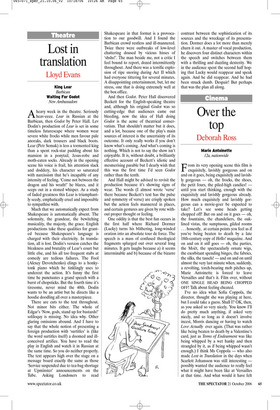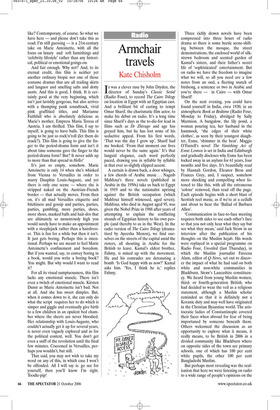Over the top
Deborah Ross
Marie Antoinette 12a, nationwide From its very opening scene this film is exquisitely, lavishly gorgeous and on and on it goes, being exquisitely and lavishly gorgeous — oh, the frocks, the shoes, the petit fours, the piled-high candies! until you start thinking, enough with the exquisitely and lavishly gorgeous already. How much exquisitely and lavishly gorgeous can a movie-goer be expected to take? Let’s see some heads getting chopped off! But on and on it goes — oh, the fountains, the chandeliers, the oaklined vistas, the sumptuous, gilded rooms ... honestly, at certain points you feel as if you’re being beaten to death by a late 18th-century copy of Hello! magazine. And on and on it still goes — oh, the parties, the Moët, the spectacularly ornate wigs, the exorbitant spending binges, the fabrics, the silks, the tassels! — and on and on until almost the very last minute when, suddenly, a revolting, torch-bearing mob pitches up, Marie Antoinette is forced to leave Versailles and that’s it. Film over, without ONE SINGLE HEAD BEING CHOPPED OFF! Talk about feeling cheated.
I’ve no idea what Sofia Coppola, the director, thought she was playing at here, but I could take a guess. Shall I? OK, then, as you asked so very nicely. You know I’ll do pretty much anything, if asked very nicely, and so long as it doesn’t involve incest, Morris dancing or having to watch Love Actually ever again. (That was rather like being beaten to death by a Valentine’s card, just as Terms of Endearment was like being whipped by a wet hanky and then strangled by it, as if being whipped wasn’t enough.) I think Ms Coppola — who also made Lost in Translation in the days when Scarlett Johansson was still interesting possibly wanted the audience to really feel what it might have been like at Versailles at that time. And what would it have felt like? Contemporary, of course. So what we have here — and please don’t take this as read; I’m still guessing — is a 21st-century take on Marie Antoinette, with all the focus on luxury and soft furnishings and ‘celebrity lifestyle’ rather than any historical, political or emotional goings-on.
And fair enough. Why not? And, to its eternal credit, this film is neither yet another ordinary biopic nor one of those costume dramas that are all trailing skirts and languor and smelling salts and dotty aunts. And this is good, I think. It is certainly good at the very beginning, which isn’t just lavishly gorgeous, but also arrives with a thumping punk soundtrack, vivid pink graffitied titles, and Marianne Faithfull who is absolutely delicious as Marie’s mother, Empress Maria Teresa of Austria. I am thrilled. This film, I say to myself, is going to have balls. This film is going to be just so rock’n’roll (let them do crack?). This film is going to give the finger to the period-drama form and isn’t it about time someone gave the finger to the period-drama form? But? It never adds up to more than that spread in Hello!
It’s just so empty, somehow. Marie Antoinette is only 14 when she’s whisked from Vienna to Versailles in order to marry Dauphin Louis-Auguste, and yet there is only one scene — where she is stripped naked on the Austrian–French border — that actually moves. From then on, it’s all mad Versailles etiquette and bitchiness and gossip and parties, parties, parties, gambling, more parties, shoes, more shoes, masked balls and hair-dos that are ultimately so monstrously high you would surely have to make an appointment with a steeplejack rather than a hairdresser. This is fun for a while but then it isn’t. It just gets boring. Perhaps this is intentional. Perhaps we are meant to feel Marie Antoinette’s confinement and boredom. But if you wanted, say, to convey boring in a book, would you write a boring book? You might. But why would I want to read it?
For all its visual sumptuousness, this film lacks any emotional muscle. There isn’t even a twitch of emotional muscle. Kirsten Dunst as Marie Antoinette isn’t bad. Not at all. And she has sweet dimples. But, when it comes down to it, she can only do what the script requires her to do which is simper and giggle and eventually give birth to a few children in an opulent bed chamber where the sheets are never bloodied. Her relationship with Louis-Auguste, who couldn’t actually get it up for several years, is never even vaguely explored and as for the political context, well. You don’t get even a sniff of the revolution until the final few minutes. Cocooned in Versailles, perhaps you wouldn’t, but still.
That said, you may not wish to take my word on any of this, in which case I won’t be offended. All I will say is: go see for yourself, then you’ll know I’m right. Toodle-pip!



































































































 Previous page
Previous page